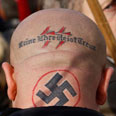
German states push ahead with Neo-Nazi party ban
Legal bid to ban far-right NPD party underway despite Merkel's reservations; House to vote on whether to move case to Constitutional Court
The heads of Germany's 16 federal states unanimously agreed on Thursday to push ahead with a legal bid to ban the far-right National Democratic Party (NPD) despite reservations from Chancellor Angela Merkel.
Related Stories
- Twitter shuts out German neo-Nazi group's account
- German city battles elusive new-look neo-Nazis
- Report: German police fear neo-Nazi attacks
The agreement follows a similar recommendation by regional interior ministers on Wednesday. The Bundesrat upper house, which represents the federal states, will now vote on Dec. 14 on whether to file a case with the Constitutional Court in Karlsruhe.
Hitleresque
Opposition Social Democrat (SPD) Brandenburg state premier Matthias Platzeck said the decision sent a clear signal. "Our democracy is well-fortified and we will not just stand by and watch the activities of neo-Nazis," he said.
Opposition parties have stepped up their call for a ban of the NPD, which critics say is inspired by Adolf Hitler, since the discovery last year that a neo-Nazi cell had waged a racist killing spree over nearly a decade.
But many Germans, haunted by memories of Nazi and Communist regimes which silenced dissent, are fearful of shutting down political parties.
An attempt to ban the NPD in 2003 collapsed because informants high in the party were used as key witnesses.
Merkel's reservations
Merkel has said she wants to be sure any case is watertight as she does not want to risk failure a second time round. That, she argues, could backfire and help legitimize the NPD in the eyes of some voters.
Other critics argue that a ban would merely push the NPD underground and make it more difficult to monitor.
The Bundesrat does not need the support of the government, although many state premiers have said they would prefer to have Merkel and the Bundestag lower house on board to show unity.
The states have compiled about 2,600 pages of evidence against the NPD and are expected to file their case in about three months. It is unclear whether the court could rule on the case before elections in September.
The state interior ministers said on Wednesday they had been meticulous in ensuring that the information they had on the NPD this time did not come from government informants.
The begning of the end
To win, the states have to prove that the NPD, which as a legitimate party receives around 1 million euros ($1.3 million) a year in taxpayers money, has an actively belligerent, aggressive stance and aims to damage or abolish democracy.
Germany's domestic intelligence service has described the NPD as "racist, anti-Semitic and revisionist" and says it aims to abolish democracy. The party calls the German constitution a "diktat" imposed by victorious Western powers after 1945.
More radical than populist anti-immigration parties in France, Britain and the Netherlands, the NPD has seats in two state assemblies in eastern Germany.
While the party leadership is careful to show an acceptable face, experts argue that many NPD members have unofficial links to violent and racist groups.
The NPD has denied having any links with the cell of neo-Nazis who killed a number of foreigners and a policewoman between 2000 and 2007 which called itself the Nationalist Socialist Underground (NSU) and it even condemned the murders.
But experts say that at least on an informal level, some NPD members did have links to the individuals in the cell.










